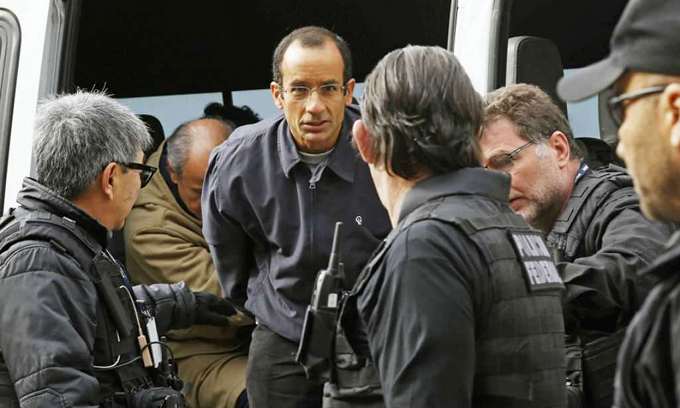
by Eric Jackson
The National Assembly has saved the ability of foreign corporations that notoriously pay bribes to continue their operations in Panama. Only six of the 71 deputies voted against a final version of a new public contracting law that bars consideration of foreign bribery convictions for the purpose of disqualifying corrupt companies from getting public contracts here. Panama’s banking, corporate and campaign finance secrecy laws will probably keep us from knowing how much the legislators were paid for that service.
President Varela, much of the Panamanian legal profession and knee jerk nationalists with varying credentials have all been quick to shift the onus in light of the Panama Papers revelations. It’s not so much about how corrupt Panama is, but how corrupt the countries who supply the clients for Panama’s money laundering law firms are. The first political casualties of the massive document leak, however, did not lose face and positions because they were caught laundering bribes. They fell because they were shown by new documentary evidence to be flagrantly insincere.
Is the sincerity issue one by which governments ought to be judged as well? What the Panama Papers revelations tell those who have been watching new laws and new assurances to get Panama off of this tax haven gray list or that money laundering black list is how very insincere all of that has been. The leaks were, after all, papers with details of the often sordid work of a firm whose founding partner is a minister without portfolio in the Panamanian cabinet and is the functioning chief executive of the president’s political party. They have told tales of money laundering for public corruption, drug cartels and tax cheats. The issue can be turned around. Is the true outrage the dishonest assurances of Panamanian administrations, or is it the acceptance of those assurances by foreign governments who well knew that they were bogus? “Globalization” on corporate terms means the economic and political power of an international oligarchy, among whom there thrives a culture of evading taxes and occasionally conducting illegal transactions via offshore shell companies. The politicians who accepted Panama’s assurances when they had reason to disbelieve them were by and large beholden to oligarchs like that.
The foreign press has not picked up on the political gyrations, redactions and amendments of the amendments that took the Brazilian construction giant Odebrecht Group off of the hook, so by and large it might be supposed that it’s ugly politics as usual but just a local story for which there will be no consequences abroad. However, there are three important consequences for domestic Panamanian politics, which might just mean that the five years and out cycle for ruling parties has been reinforced or might mean something more significant:
- This was an end of the legislative session set of maneuvers. The next time we will see the deputies together in action will be on July 1, when they elect leaders for the next legislative year. Last July an attempted alliance between exiled former President Ricardo Martinelli and PRD president Benicio Robinson tried to gain control of the legislature, on a platform of stopping prosecutions for Martinelli regime corruption and impeaching President Juan Carlos Varela. Both Martinelli’s and Robinson’s parties split over that, and now there is a strange alliance finishing a term characterized by the stagnation of anti-corruption efforts, little money to do anything of significance beyond what had been already planned, a set of rigged contracting procedures for those projects that are going ahead that’s more closely aligned with the practices of pre-Martinelli administrations, and then the bombshell of the Panama Papers revelations, the next wave of which hits with those files being opened to Panamanians who are not connected with La Prensa on May 9. The vote, given its context, is probably a sign that the divisions for last year’s vote no longer apply.
- President Varela’s Panameñista Party has the legislature’s third-largest caucus. Varela is president on the strength of support from independent voters and disaffected fringes of the memberships of other political parties. But if the different party factions mostly came together for this “public contracting reform,” key independent forces that supported Varela for president have broken with the administration. There is only one independent legislator, Ana Matilde Gómez. On the floor of the assembly’s chamber, she declared that her colleagues “will pay a high political price for not having closed the door to international corruption.” The Independent Movement (MOVIN), which was a key part of the coalition that backed Varela’s presidential bid and was one of the primary backers on a ban on corrupt companies doing business with the government, issued a blistering communique that alleged that the public had been “defrauded” and that Panama “cannot with moral authority make claims to the world” in light of the vote.
- If one wants to look at MOVIN as just this little civil society faction that has no ballot status, it would be easy to dismiss their importance. If you consider it the not very well disguised voice of the Motta family, Panama’s richest clan, then its probable defection from the Varela camp takes on a greater significance. Add to that the strong complaints of the Chamber of Commerce — the vote “sends a wrong message to the country and to the international community,” chamber president Jorge García Icaza said. We are seeing the same sort of dropoff of business support for Varela that earlier presaged the eventual failure of Martinelli’s “Entrepreneurial Government” project.
So if Marcelo Odebrecht’s gravy train is sidetracked for a moment in Brazil, it’s full speed ahead here in Panama. Barring any wrecks, of course.

~ ~ ~
The announcements below are interactive. Click on them for more information











